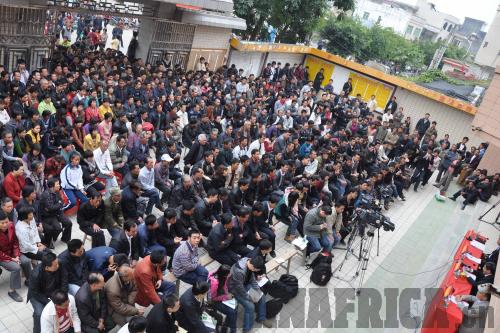|
 |
|
LET'S TALK:Villagers and officials reach a compromise (CNS PHOTO) |
The tiny Chinese village of Wukan in Guangdong Province has gone from obscurity to public prominence in three months. More than 10,000 villagers who call Wukan home embarked on a three-month long confrontation with the local government in September 2011, an event watched closely by the entire country. In the process, much public debate was stirred up, providing food for thought about how the country should be governed, most notably in rural areas.
According to observers, the major reason for the conflict was the election of the village head in February 2011, who led the newly elected villagers' committee in their bid to sell Wukan's last piece of farmland of 404 mu (27 hectares) to real estate developers without informing the villagers.
The villagers appealed to higher authorities for intervention on September 21 and November 21, but received no reply, and peaceful protest became confrontation. The villagers blocked all the roads leading to the village to prevent police from entering. They even elected an "interim villagers' council" to replace the previous villagers' committee to manage their own affairs, trying to reclaim the farmlands that were previously sold.
Change of attitude
"The interests conflicts between the government and local people is natural in Guangdong Province, a place widely regarded as China's forerunner of reform and opening up where about 110 million people live, including a 30-40 million migrant population," Ma Licheng, a senior news commentator of People's Daily told the Economic Observer. "The key is, what attitude the government should take in dealing with such events."
According to Ma's observation, after the protest took place in September, the local government adopted harsh measures to cool public sentiment, but this only led to greater resistance.
The intervention of the Provincial Government of Guangdong in December is widely regarded as a turning point of the protests. On December 20, the provincial government sent a work group headed by Zhu Mingguo, Deputy Secretary of the Guangdong Provincial Committee of the Communist Party of China (CPC) to Wukan to resolve the conflict.
"You can see the attitude of the work group in dealing with the confrontation, which is totally different from the previous attempts by the local authorities," commented Ma, adding that the most prominent change was that the work group put people's interests first and did not only focus on maintaining stability.
While meeting the villagers, Zhu stressed that their main requests were reasonable and their actions understandable. He also admitted that some local government officials had erred in the way they had handled things. On December 28, the work group also declared the villagers' committee elected in early 2011 illegitimate. Xue Chang, former Secretary of the CPC Wukan Branch who had led the villagers' committee for 41 successive years, was detained and put under investigation. More importantly, villagers got their land back.
"This is a great change in dealing with mass disturbances, a more positive approach," said Ma at a seminar on Wukan affairs held on December 22 in Beijing.
|